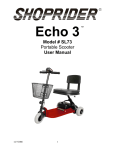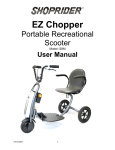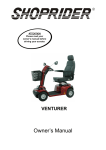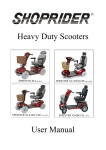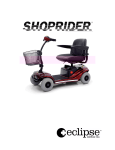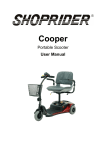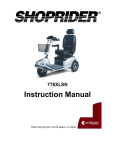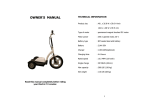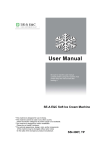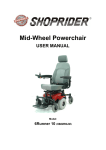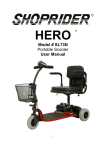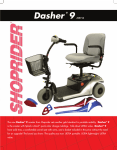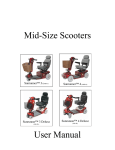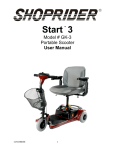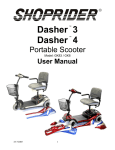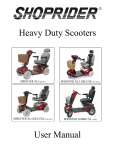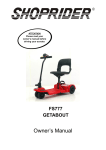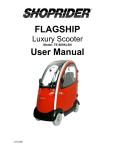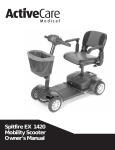Download Dasher 9
Transcript
Dasher 9 ® Portable Scooter User Manual 4/3/2007 Table of Contents INTRODUCTION…………………………………………………………….…………33 FEATURE GUIDE…………………………………………………………….………..33 SAFETY ADVICE………………………………………………………………….…...4 4-5 EMI WARNING………………………………………………………….…………….. 5-6 ADJUSTMENTS………………………………………………….……………………..7 7-8 SCOOTER TILLER CONTROLS………………………………….…………………..1 9 DRIVE/FREEWHEEL OPERATION…………………………………………………10 10 STARTING TO DRIVE YOUR SCOOTER………………………………………….11 11 EXTRA GUIDELINES IN THE CONTROL OF YOUR SCOOTER……………….12 12 TRANSPORT/STORAGE……………………………………………………………..13 13 BATTERIES AND BATTERY CHARGING………………………………………….14 14 MAINTENANCE………………………………………………………………………..15 15 TROUBLESHOOTING GUIDE……………………………………………………….15 15 TECHNICAL SPECIFICATIONS……………………………………………………..16 16 QUARTERLY INSPECTION………………………………………………………….17 17 NOTES.................................................................……………………………… 18-19 WARRANTY AND DISCLAIMER………………………………………………… 20 4/3/2007 2 INTRODUCTION Congratulations on your purchase of the Shoprider® Dasher 9 Portable scooter. The Dasher is the ultimate combination of style, comfort and portability. The Dasher comes with three interchangeable colors, giving you the choice of a different color every day, and includes several innovative and convenient features. The Dasher goes with you wherever you go and can be assembled or disassembled in just seconds with wireless quick-connect components. The Dasher is super light and compact, and can be stored in small areas such as the trunk or back seat of your car. The compact features support easy transportation of your Dasher for today’s active lifestyle. The Dasher can be used in confined spaces both indoors and out. Direct drive transaxle and electromagnetic brake give a safe and efficient ride. We know that the Dasher portable scooter will provide many years of mobility for you. Please ensure that you read this manual carefully, it is important for your safety that you understand the guidelines and instructions given. 1 SMART FEATURE GUIDE (Fig 1) 1. Tiller control head 2. Detachable seat with fold down Back with removable pads 3. Flip down arm rests 4. Detachable basket 5. Detachable battery-pack 6. Tiller adjustment knob 7. Swivel seat lever and seat release lever 8. Puncture proof tires 9. Anti-tip wheels 10. Tiller lock for transport (For Safety, this lock is designed to break away if the scooter is driven when locked) 3 4 7 6 10 5 9 8 Figure 1 4/3/2007 2 3 SAFETY ADVICE x DO NOT carry passengers. x DO NOT exceed inclines over 6 degrees (10% grade). x DO NOT turn on steep inclines. x DO NOT turn suddenly at high speeds. x DO NOT get on or off the scooter unless the brake is on and the scooter is switched off. x DO NOT switch off the scooter while the scooter is moving. x DO NOT drive the scooter where you can not safely or legally walk. x DO NOT drive the scooter on the road, street or highway. x DO NOT attempt to drive over curbs greater than 2 inches in height. Doing so could cause your scooter to turn over, causing injury or damage to the scooter. x DO NOT drink or use a mobile phone when driving your scooter. x DO NOT exceed the suggested user weight limit. Doing so, could cause personal injury and invalidate the warranty. x ALWAYS keep your feet on the scooter when moving. x Consult your doctor if there is any doubt about your ability to use a scooter safely. x ALWAYS slow down and proceed carefully when traveling over rough or uneven ground. x For individuals with balance problems practice getting on the scooter with assistance of a qualified healthcare professional. x DO NOT operate the scooter without anti-tip wheels installed. x DO NOT use an escalator to move a scooter between floors. Serious injury could occur. x DO NOT drive the scooter on an incline that has oil, water or ice film on it. x DO NOT try to lift the scooter by its seat, tiller, or any removable parts. Any of these could cause injury to the user or damage to the scooter. x DO NOT use parts or accessories that are not authorized by Shoprider®. x Before sitting in or exiting the scooter, REMOVE the key from the ignition. This will insure the POWER is off and the scooter can not move under its own power. x As a general precaution, always remove the key from the ignition while the scooter is not in use. This will prevent use by untrained and unauthorized persons. x DO NOT connect any medical device to the scooter battery. This could cause failure of the device, the scooter and personal injury. x Make sure the tiller is properly adjusted to the user or damage and injury could result. x DO NOT transport in a vehicle WHILE seated on the scooter. Shoprider® will not be responsible for any injury or damage that might result. x DO NOT use the scooter in the rain or near any other water source where the scooter may get wet. Direct exposure to rain or dampness could cause damage to the scooter electrical components. 4/3/2007 4 x For maximum battery life, make sure to fully charge batteries for up to 12 hours prior to first use. EMI WARNING Shoprider® scooters may be susceptible to electromagnetic interference (EMI), which is a kind of interfering electromagnetic energy (EM) emitted from sources such as radio stations, TV stations, amateur radio (HAM) transmitters, two-way radio, and cellular phones. The interference (from radio wave sources) can cause the scooter to release its brakes, move by itself, or move in unintended directions. It can also permanently damage the scooter’s control system. The sources of radiated EMI can be broadly classified into three types: 1. Hand-held portable transceivers (transmitters-receivers) with the antenna mounted directly on the transmitting unit. Examples include: citizens band (CB) radios, “walkie talkie”, security, fire and police transceivers, cellular telephones, and other personal communication devices. NOTE! Some cellular telephones and similar devices transmit signals while they are ON, even when not being used. 2. Medium-range mobile transceivers, such as those used in police cars, fire trucks, ambulances, and taxis. These usually have the antenna mounted on the outside of the vehicle. 3. Long-range transmitters and transceivers, such as commercial broadcast transmitters (radio and TV broadcast antenna towers) and amateur (HAM) radios. NOTE! Other types of hand-held devices, such as cordless phones, laptop computers, AM/FM radios, TV sets, CD players, and cassette players, and small appliances, such as electric shavers and hair dryers, so far as we know, are not likely to cause problems to the scooter. Scooter Electromagnetic Interference (EMI) Because EM energy rapidly becomes more intense as one moves closer to the transmitting antenna (source), the EM fields from hand-held radio sources (transceivers) are of special concern. It is possible to unintentionally bring high levels of EM energy very close to the scooter’s control system while using these devices. This can affect scooter movement and braking. Therefore, the warnings listed below are recommended to prevent possible interference with the control system of the scooter. 4/3/2007 5 WARNINGS 1. Do not operate hand-held transceivers (transmitters-receivers), such as citizens band (CB) radios, or turn ON personal communication devices, such as cellular phones, while the scooter is turned ON. 2. Be aware of nearby transmitters, such as radio or TV stations, and try to avoid coming close to them. 3. If unintended movement or brake release occurs, turn the scooter OFF as soon as it is safe. 4. Be aware that adding accessories or components, or modifying the scooter may make it more susceptible to EMI. NOTE! There is no easy way to evaluate the overall immunity of the scooter. 5. Report all incidents of unintended movement or braking to your Shoprider® provider, and note whether there are sources of EMI nearby. WARNING! Shoprider® is not responsible for damage or injury incurred due to improper and unsafe use of our scooter. 4/3/2007 6 ADJUSTMENTS Tiller angle adjustment Tiller Angle Adjustment (Fig 2) At the base of the tiller is a round knob. Turn the knob counterclockwise to loosen the tiller and select the desired tiller angle. Turn the knob clockwise to securely lock the tiller into place. Below the knob there is a lock designed to stop the tiller from turning left or right. **Do not forget to unlock this before driving the scooter** NOTE: For Safety, this lock is Tiller lock designed to break away if the scooter is driven when locked. Figure 2 Tiller angle adjustment knob Folding the Tiller (Fig 3) Fold down the tiller by loosening the tiller angle adjustment knob located at the base of the tiller (fig 3). Tighten knob to lock tiller in place. You may lock the tiller assembly into place so that it doesn’t swing from side to side by lifting the yellow tiller lock lever up and to the right. Figure 3 Seat Removal (Fig 4) Fold down the back of the seat. Lift the swivel seat release handle up to lift the seat up and off the seat post. Fold down seat assembly 4/3/2007 7 Figure 4 Seat Post Seat Height Adjustment (Fig 5) Remove seat as described (fig 4). Remove battery pack (refer to disassembly section). Using two 13mm wrenches, remove locking bolt and nut. Adjust seat post up or down to desired position. The seat height can be adjusted to five different positions by inserting the locking bolt in the desired hole. Replace washer and nut and tighten. Replace battery pack and seat. Serial Number Serial Number (Fig 5) Serial number is located on the seat post. It is on a white sticker with a barcode. The serial number is 13 alphanumerical digits beginning with a 1. Figure 5 Armrest Width Adjustments (Fig 6) On the underside back of the seat there are two arm rest hand knobs, one on each side. Turn hand knobs counterclockwise to loosen. Loosening the arm rest hand knob allows the armrest width to be adjusted or arm rest to be removed. Once the desired positions of the arm rests are set, tighten the hand knobs by turning clockwise to lock the arm rests into place. Armrest Adjustments (Fig 6) The arm rests are hinged and can be pulled up and out of the way for sideways transfer. Pull arm rest up and back. 4/3/2007 8 Pull Arm Up Arm Rest Hand Knob Figure 6 SCOOTER TILLER CONTROLS (FIG 7) Speed Controls The speed control allows you to set a speed between slow (turtle) and fast (rabbit). Battery Level Indicator Gauge Where the needle sits, shows the amount of charge left in your batteries. The amount of charge will only show at its true level when the scooter is in drive. Always charge the batteries completely before beginning out on any journey. Caution – Do not allow the gauge needle to go down completely as complete discharge of the batteries could cause irreversible battery damage. Horn A yellow button on top of the tiller operates the horn. Thumb Lever Controls The left thumb lever controls the reverse and the right thumb lever controls the forward motion. The amount of pressure applied to each lever will determine the speed the scooter travels at up to the speed selected. Release the thumb lever and the scooter will automatically come to a stop as the electromagnetic brake is applied to the motor. On/Off Key Switch Insert the key into the key switch located on top of the tiller. Turn the key and the battery gauge needle will move. There may be a slight delay before the thumb lever control can be operated, while the main controller checks the circuits. Electromagnetic Brake The brake is automatically operated when the thumb control levers are pressed or released. There is a slight delay when the scooter accelerates and decelerates; this allows the scooter to start smoothly and come to a smooth stop. Battery Level Indicator Gauge On/Off Key Switch Horn Button Speed Control Dial Thumb Lever Control (Reverse) Thumb Lever Control (Forward) Figure 7 4/3/2007 9 DRIVE/FREEWHEEL OPERATION (FIG 8) The drive/freewheel lever (yellow ball handle) is located under the seat at the right rear of unit. This lever allows you to disengage the drive mechanism and push the scooter while in freewheel mode. To disengage the drive mechanism (neutral), move the lever forward (the scooter can now be pushed). To re-engage the drive mechanism (drive), move the lever backward (now the unit may be driven). Note: The scooter will not operate while the drive/freewheel lever is in the neutral position (forward). The scooter must be turned off, lever moved backward (drive position) and then turned on in order to reset the circuits. WARNING! Always re-engage the free wheeling device after use. Failure to do so may result in injury. Anti-tip wheels The anti-tip wheels are located at the rear of the scooter frame (Fig 8). The scooter should not be used unless the anti-tipping wheels are in place. Shoprider® is not responsible for damage or injury incurred due to improper or misuse of the scooter. Scooter serial number The scooter serial number is located on the seat post and consists of a combination of 13 numbers and letters. Shoprider recommends that you write the serial number down on the back of this manual for future reference. Refer to Fig 5. Circuit Breaker (Reset Button) Charging Port Detach Lever (yellow) Free Wheel Lever (yellow) Anti-Tip Wheels Figure 8 4/3/2007 10 STARTING TO DRIVE YOUR SCOOTER First Time Use Prior to using your Dasher Portable scooter for the first time, you must charge the batteries fully (refer to Battery Charging Procedures). Charging may take up to 12 hours. Charging the batteries completely prior to first time use will benefit battery efficiency. Failure to do so may cause permanent damage. Getting Started x Select a level area with plenty of space. x Mount the scooter by pushing the arm upward out of the way and sliding onto the seat or swivel the seat around to mount. Use the arm rest for support if necessary. x Adjust the tiller and seat as previously described. Starting Scooter Movement x Ensure that you are seated in a comfortable position. x Turn the key to the on position. x Your speed setting should be on or near the turtle (slow). x Push your right thumb lever (yellow) and the scooter will move forward slowly. The harder you push, the faster the scooter goes but will only reach the speed level that has been selected. x Release the lever and the scooter will slowly come to a stop as the magnetic brake automatically engages. Steering Steering the scooter is light and easy. When starting off ensure that you give a wide clearance when turning so that the rear wheels clear any obstacle that you are passing. When steering through limited spaces such as a doorway or when turning around, turn the tiller handles where you want to go and apply power gently. The scooter will turn very tightly, but will still move with complete stability as long as the speed is not too high. Reversing Before reversing ensure that the area behind is free from any hazards or obstructions. Adjust your speed setting to a low setting before you move in reverse. Push your left thumb lever (black), and steer wide of all corners and obstacles. Dismounting Before dismounting ensure that the key is turned to the off position. Dismount the scooter by pushing the arm upward out of the way and sliding off the seat or swivel the seat around to dismount. Use the arm rest for support if necessary. CAUTION: Please ensure that care is exercised when mounting or dismounting the scooter and that the tiller and foot rest is not used for support. 4/3/2007 11 EXTRA GUIDELINES IN THE CONTROL OF YOUR SCOOTER Ramps The stability of your scooter is governed by several factors such as the seating position, the angle of the slope and your height and weight. When approaching an incline, do so directly and not at an angle and where ever possible avoid making turns. When going down a ramp or slope keep the speed settings to slow. This will ensure there is a safe controlled descent. When the thumb levers are released the scooter will slowly stop. Safe Climbing Angle Always follow the guidelines of the safe climbing angle as shown in figure 10a. Caution - Do not turn off the control key while the unit is in motion Grass and Gravel Please follow the guidelines given previously and your scooter will perform admirably over many surfaces. Avoid long grass, loose gravel and sand. NOTE: You should not operate your scooter in wet weather or on wet surfaces. This may cause the motor to short out or cause other irreversible damage. NOTE: To preserve battery charge, your scooter may go into sleep mode after being idle for a few minutes. To remove from sleep mode, turn the key off and back on again. Figure 9 4/3/2007 12 TRANSPORT / STORAGE The Dasher Portable scooter is designed to be quickly and easily disassembled into sections for transportation and storage. Follow these simple guidelines for disassembly: Dasher 9 Disassembly (Fig 9 & 10) 1) Remove the front basket: Lift basket up and off. 4 2) Fold the seat down and remove: Pull yellow 2 swivel seat lever up and lift seat up and off. 3) Remove battery pack: Lift battery pack up 1 and off using handle (Note: battery pack is secured by Velcro). 5 4) Fold tiller down and lock into place: Loosen tiller adjustment knob, lower tiller, and tighten 3 adjustment knob. Lock tiller assembly by pulling yellow lever up and to the right. 5) Detach rear section from front section: Figure 10 Detach lever (yellow) is located in the rear of the scooter next to the freewheel lever. Slide lever to “detach” and separate rear section from front section. 5 2 4 3 1 Figure 11 4/3/2007 13 BATTERIES AND BATTERY CHARGING The Shoprider® Dasher Portable scooter is supplied with maintenance-free, sealed lead acid batteries. For easy handling, the batteries are contained within a battery pack. Battery life and performance may be affected by temperature, terrain, condition of battery, the weight of the user, and care of batteries. The battery needle gauge is only a guide and is most effective when the scooter is moving, only then is the true discharge level displayed. x When the scooter stops the battery needle gauge may indicate full. x An active user can use up to 30% of battery capacity or more per day. x Inactive users may only use 50% of battery capacity in a week. x In both these instances the battery should be put on charge over night. Keeping the batteries charged will extend the life of the batteries Battery Charger The battery charger is a 2A or 3A off board. The Dasher Portable scooter has a built in charger port on the rear side of the battery pack. This special feature allows the batteries within the battery pack to be charged without the scooter. A compartment built into the battery pack is designed to store the battery charger when not in use. First Time Use Prior to using your Dasher Portable scooter for the first time, you must charge the batteries fully (refer to Battery Charging Procedures). Charging may take up to 12 hours. Charging the batteries completely prior to first time use will benefit battery efficiency. Failure to do so may cause damage. Charging To charge the batteries plug the A/C cord plug into the wall socket and connect the 3-pin male plug lead into the 3-pin female battery-charging socket located on the battery pack. The battery charger has two indicator lights. The red light, when solid, indicates power. The green light will flash when charging and go solid green when the charging cycle is complete. If the red light flashes when charger is plugged into charging port of battery pack, then there is a problem. Please contact your provider or Shoprider for assistance. Once the batteries are completely charged, unplug the A/C cord from the wall then unplug the 3-pin lead from the battery pack. WARNING: Only use the original Shoprider approved charger! This charger is for indoor use only. DO NOT expose it to rain or water spray. Do not leave the charger plugged into the charger port if the charger is not charging. 4/3/2007 14 MAINTENANCE Tires Since your tires are flat free tires, there is no need to ever worry about tire air pressure. General Maintenance and Lubrication x Inspection for loose wheel bolts, seat and arm tightening bolts, and other nuts and bolts is recommended on a regular basis. x Most lubricated components on the Dasher Portable scooter are designed to be maintenance free and are sealed. Therefore lubrication is not required for these components. However, the driving axles and seat post should always have a very light coat of multipurpose grease. DO NOT USE TOO MUCH GREASE! Drips may stain or damage carpets, furnishings, etc. x It is recommended that the driving axles (inside the drive wheel assembly) be checked and cleaned occasionally for hair and debris build-up, which will hinder the performance of the unit. x Check the batteries on a regular basis. For extended battery life, it is highly recommended that the batteries be fully charged after each use. If the batteries are weak, severely discharged or old, a variety of problems may occur with the unit including charging problems, reduced speed, loss of range, and others. Please contact your local Shoprider® provider for battery replacement. TROUBLESHOOTING GUIDE Circuit Breaker (Reset Button) Your scooter is fitted with the latest in electronic controls that are programmed to protect the electrical system from abnormal overloads. Provided for extra protection is a circuit breaker, located on the side of the battery pack. Should there be a situation where your scooter stops for no apparent reason, please check that the circuit breaker has not popped. NOTE: To preserve battery charge, your scooter may go into sleep mode after being idle for a few minutes. To remove from sleep mode, turn the key off and back on again. Check List If your scooter fails to operate, please check the following: x Unit is switched on. x Drive/Freewheel mechanism is in the drive position. x All plugs and connectors are clean and firmly connected. x Battery level shows full charge. If the free wheel device has been operated with the scooter switched on, then the scooter will not operate until the ignition key has been switched off and then on again. Please consult your dealer if your scooter does not run after checking these points. 4/3/2007 15 TECHNICAL SPECIFICATIONS UNIT SPECIFICATIONS DASHER 9 1 Overall Dimensions: L x W x H in 38.8” x 22” x 36” Front 9” x 1 Flat Free Rear 9” x 2 Flat Free lb MAX. 300 lb 35 lb 110 lb 35 _V_Ah x Pcs 12V 21Ah x 2 Charger Output Power of Motor Maximum Speed2 (on the level road) Amp hp mph 2 or 3 (Off Board) 0.75 3.8 Safe Climbing Angle (Maximum Single User Weight) %(º) 10 (6) / 16 (9) Refer to fig 9 Number, Size of Tires Suggested User Weight (on the Level Road) Weight of Heaviest Part (Battery Pack 21Ah x 2) Total Weight (w/ 21Ah Battery Pack, Basket, Seat) Battery Pack Module Weight Battery Module Capacity Range3 (per charge w/ STD 21AH Battery / 90 kg User Weight) (After the battery and mechanical moving parts fully break in) Turning Radius Detachable Chassis mile in Y/N 11.2 31.5” Y ***ALL SPECIFICATIONS ARE SUBJECT TO CHANGE WITHOUT PRIOR NOTICE*** 1. Include the Anti-Tip wheel. 2. Driver weight may exceed weight of the unit; speed must be reduced when turning. 3. The actual driving range varies with the factors shown below: a) the weight of occupant b) ground surface c) battery conditions d) type of charger e) ambient temperature f) the way of driving g) terrain 4/3/2007 16 QUARTERLY INSPECTION For your own safety, quarterly inspection and service of the product by an authorized dealer is recommended. There may be a nominal dealer inspection fee for this service not covered by warranty. Maintenance records (below) should be kept at all times. The manufacturer / distributor / vendor will be indemnified from any product liability claim if the above maintenance / service requirement not met. NOTE! Regular inspection is recommended by the manufacturer to ensure ultimate performance of the vehicle. Service Record: Date of Purchase: / / Purchaser:____________________________________________________ Model #: DASHER 9 Serial #: ___________________________________ Dealer Unit Was Purchased From: _______________________________ M / D / Y M / D / Y M / D / Y M / D / Y M / D / Y M / D / Y M / D / Y M / D / Y M / D / Y M / D / Y M / D / Y M / D / Y M / D / Y M / D / Y M / D / Y M / D / Y M / D / Y M / D / Y M / D / Y M / D / Y M / D / Y M / D / Y M / D / Y M / D / Y M / D / Y M / D / Y M / D / Y M / D / Y M / D / Y M / D / Y M / D / Y M / D / Y M / D / Y M / D / Y M / D / Y M / D / Y 4/3/2007 17 Notes: 4/3/2007 18 Notes: 4/3/2007 19 WARRANTY Please refer to warranty information included with unit. DISCLAIMER Congratulations on your purchase of the Shoprider® Dasher Portable scooter. It is not intended to be used by individuals with physical limitations that could prevent the user from operating this unit safely. Shoprider® disclaims all responsibility for any personal injury or property damage, which may occur as a result of improper or unsafe use of its products. Mechanical or electrical defects will be dealt with on a contingency liability basis. The preceding guidelines are intended to assist you in the safe operation of your powered scooter. If you should have any questions about the correct operation of your scooter, please contact your authorized Shoprider® provider. Model Name: DASHER 9 Serial No. Provider’s Stamp Shoprider® Mobility Products, Inc. (800) 743-0772 www.shoprider.com 4/3/2007 20 P/N: 300904-36-A4




















